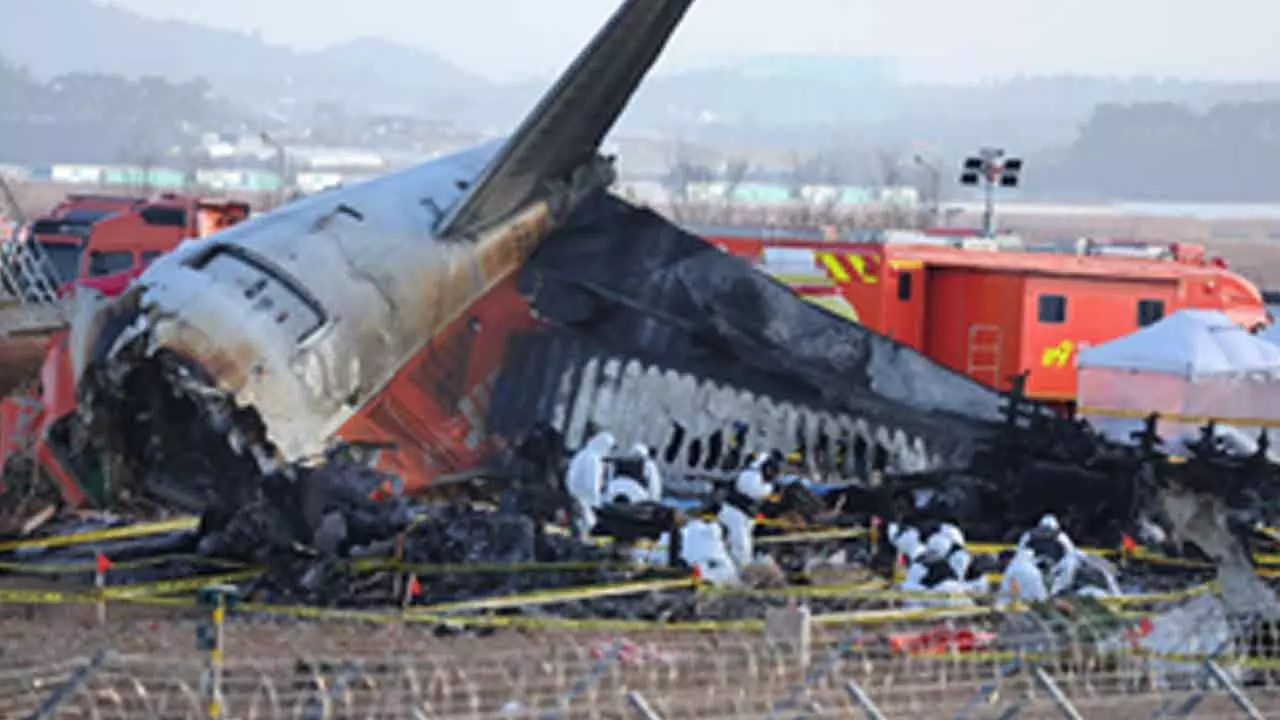Live
- Focus on medicinal plant research and quality drug production: Minister
- Odisha govt asks residents to illuminate houses
- HMPV: States told to ramp up surveillance
- PM Modi to Launch Major Development Projects in Visakhapatnam Today
- Clock towers of yore witnessed changing times of Hyderabad
- GDP may grow at its slowest since pandemic
- 95 killed as deadly quake rocks Tibet
- ACB mulls plan to quiz KTR
- Beach Festival scheduled for January 11-12
- Dushyant says people eager to end 'corrupt' rule
Just In

Concerns over maintenance challenges by low-cost carriers (LCCs) have surfaced following the Jeju Air tragedy, according to industry watchers on...
Concerns over maintenance challenges by low-cost carriers (LCCs) have surfaced following the Jeju Air tragedy, according to industry watchers on Thursday, with data showing heavy overseas reliance for critical aircraft repairs, such as engine repairs.
The apparent landing gear malfunction of the crashed Jeju Air B737-800 on Sunday has raised concerns that the airline might have prioritised operations over sufficient maintenance time, potentially compromising safety.
According to data from the transport ministry, maintenance costs spent overseas by domestic airlines totaled 1.99 trillion won (US$1.35 billion) in 2023, up 58.2 percent from 1.26 trillion won in 2019, reports YOnhap news agency.
For domestic LCCs, the increase is even more pronounced. Overseas maintenance costs by budget carriers amounted to 502.7 billion won last year, up 63.6 percent during the same period.
The rate of repairs by LCCs conducted overseas was recorded at 71.1 percent in 2023.
Among South Korean airlines, only Korean Air and Asiana Airlines, the country's full-service carriers, have the capability to perform major repairs, including engine overhauls, as they operate their own hangars and possess maintenance, repair and overhaul (MRO) capacities.
As LCCs lack these resources and must outsource major repairs, domestic MRO options remain limited, with only Korean Air and Korea Aviation Engineering & Maintenance Service offering such services.
Jeju Air CEO Kim E-bae has acknowledged the situation during a recent press briefing, stating the company performs some repairs locally and sends the rest to overseas MRO service providers.
Experts argue that developing a robust domestic MRO industry is essential for enhancing the maintenance capabilities of LCCs.
The global aviation MRO market is projected to grow to $124.1 billion by 2034, but South Korea's progress in fostering the industry has been slow.
In August 2021, the transport ministry announced a plan to strengthen the competitiveness of the domestic aviation MRO industry, aiming to increase the share of local maintenance to 70 percent by 2024.
However, it was not until April of last year that the government held a groundbreaking ceremony for the construction of the Incheon Airport Advanced Aviation Complex, a dedicated MRO cluster.
"Most LCCs rely on overseas specialists for major repairs, which can lead to cost and efficiency issues," said an aviation industry insider, who asked for anonymity.

© 2024 Hyderabad Media House Limited/The Hans India. All rights reserved. Powered by hocalwire.com






